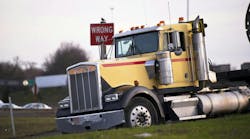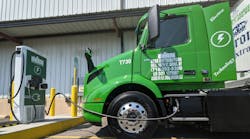There’s never any shortage of things to write about in this industry. As an essential part of the economy, trucking can sometimes seem like a magnet for those looking to solve economic, public welfare and environmental problems with regulations intended to force truck users to do the right thing. Objecting to inequity is always the right course, but sometimes those in the industry respond with automatic opposition instead of objective assessment, resulting in a loss of credibility with regulators and the general public.
Take the Compliance, Safety, Accountability program, or CSA. This twoyear- old program represents a radical change in the way the federal government evaluates fleet and driver safety. Before it officially took effect, the program was subject to widescale publicity that included offline tools allowing interested fleets to preview its impact on what would be their public safety ratings, not to mention extensive analysis by the trucking media and various trade associations.
A number of fleets invested a great deal of time and money in understanding CSA and preparing for it. For the most part, they understand the new rules and have taken the necessary steps to play by them. And yet, many other fleets now express surprise when they see just how comprehensive CSA can be when identifying violations both major and minor by drivers and the fleets they work for. Those that underestimated the scope and reach of CSA just weren’t paying attention.
Yes, the program has some major flaws (ignoring accident at-fault judgments being a major one), and some are rightly asking federal regulators to fix them as quickly as possible. But complaints by others that CSA is too good at identifying violations of safety regulations, that it exposes too much to public scrutiny too quickly, undercuts those legitimate concerns. If it expects to be taken seriously, trucking needs to acknowledge that CSA does what it was designed to do—capture violation information more quickly—and focus on fixing the elements that are proving in practice to be unfair.
Regulation of diesel engine emissions is another area where trucking would do well to temper criticism with a more objective evaluation. Clearly the cost of new technology to meet federal emissions standards has added enormously to the price of new trucks, as much as a third in many estimates. Worse, few see any benefit to go along with the added cost. So, you might rightly ask, what’s to like?
How about an entirely new public image for diesel-powered trucks? In a general opinion survey completed late last year by the Diesel Technology Forum, some 56% of those responding said they’d seen “a noticeable improvement in emissions from diesel trucks,” and 62% said diesel technology is part of our energy future. In the public’s mind, “those dirty trucks” are quickly becoming “those clean trucks.”
Before you dismiss that shift in image as being irrelevant to your business, think back to calls for a total diesel ban. One of the more serious came from California’s Air Resources Board, a regulatory group with the power to create and enforce such a ban. Just two months ago, CARB actually released a video touting the benefits of “clean diesel” as a major contributor to environmentally sound energy policies. When a powerful critic turns into an ally, there’s a strong message in the power of changing public image.
So, of course you need to raise your voice when something is wrong. But if you want to be heard, make sure you’ve got a defensible argument, not just a complaint from an injured party, and be ready to hear the other side of that argument.


